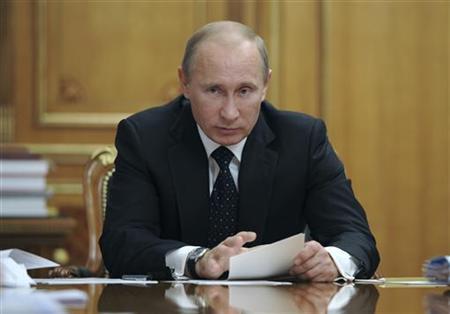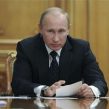
Economic Stagnation In Russia Becomes Personal for Putin
Publication: Eurasia Daily Monitor Volume: 8 Issue: 186
By:

The crucial economic signal for Russia last week was the price slide for the Urals oil blend below the $100 per barrel level, which is not only a symbolic watershed but also an inflection mark on which the Russian budget goes into red (Kommersant-FM, www.gazeta.ru, October 5). Prime Minister Vladimir Putin boldly dismissed this minor dip, asserting that oil prices remain at “acceptable levels” so that the real question for his government was how to distribute the surplus revenues (RIA Novosti, 5 October 5). Speaking at an investment forum, he took the argument one step further insisting that Russia was “emerging from the crisis” and not sinking into a new one while also offering reassurance that “Russia is prepared to deal with any scenario better than in 2008” (Kommersant, October 7). This pep-talk departs radically from the south-bound direction of all key economic indicators, particularly from the panicky stock exchange, which has lost nearly half its value in the last six months (www.gazeta.ru, www.newsru.com, October 7). What is even more striking about Putin’s positive thinking is that in recent weeks troubles have spread to the businesses in which he takes keen personal interest.
Perhaps the most irritating were the surprise raids on Gazprom’s offices in ten EU countries ordered by the European Commission in connection with an antitrust probe (Vedomosti, October 3). Putin could have shrugged it off as petty vindictiveness by Brussels bureaucrats, but the “hostile” investigation is centered on Gazprom’s ties with German companies, first of all E.ON, which have become seriously strained. Earlier this summer, Germany firmly refused to consider Putin’s idea for adding another trunk to the Nord Stream pipeline that is due to become operational in November (www.bmf.ru, October 5). Then E.ON, which had sold most of its shares in Gazprom, took the Russian behemoth to arbitration over the dispute on prices (www.newsru.com, August 1). The German partners expressed no interest in entering the off-shore Shtokman project in the Barents Sea and replacing French Total, which is re-orienting toward cooperation with Novatek on the Yamal projects (www.gazeta.ru, September 7). The latest episode in this estrangement involves well-known German expert Hans-Henning Schroeder, who was refused entry into Russia last week and attested as a “security threat” (www.newsru.com, October 6).
Another source of disagreeable news is Turkey where Putin has invested much effort in cultivating personal ties with Prime Minister Recep Tayyip Erdogan. Last week Gazprom was notified by its Turkish partner Botas that the contract from 1986 on annually importing six billion cubic meters (bcm) of gas through the Ukrainian route would not be renewed due to disagreement on prices (Ekspert, October 4). The volume is not that significant, and Turkey – charting a more pro-active course in the Middle East – probably expects to increase imports of LNG from Egypt and Libya. For Gazprom, however, the blow to the policy of relying on long-term contracts is aggravated by the Turkish procrastination on granting permission to lay the South Stream pipeline across its exclusive economic zone in the Black Sea (Nezavisimaya Gazeta, September 30).
Yet another ugly problem on Putin’s plate is Ukraine, where the economic crisis is deepening fast so its political behavior becomes desperate. President Viktor Yanukovych was the first leader to meet Putin after the announcement of the friendly rotation in the Russian duumvirate, and he exploited to the maximum the fact that Moscow could not afford a third gas war. Putin wants to stick to the letter of the agreement that he signed in January 2009 with Prime Minister Yulia Timoshenko (she was sentenced to seven years in prison for striking that deal) but has to accept a revision of the price formula and to provide a guarantee for transit, while the control over the Ukrainian gas pipelines remains elusive (Nezavisimaya Gazeta, October 3). The issue, however, is larger than the usual bargaining as Putin presented last week his grand vision of transforming the Customs Union with Belarus and Kazakhstan into an economic alliance on par with the EU (Izvestiya, October 5). Such integration could gain dynamism and make economic sense if Ukraine opts to join, but the deepening resentment in this major European state of Russia’s greed and arrogance makes it impossible for any leader to contemplate such a choice (www.gazeta.ru, Moskovskiy Novosti, October 6).
Putin cannot miss the gravitation of all these troubles toward Gazprom, which behaves as if the dawning “golden age” of gas delivers it from the need to modernize its archaic and wasteful business model. Its response to the problems in the key export markets was to increase the 2012 investment program by as much as 50 percent prioritizing new pipelines, which guarantees fat profits to the select few affiliated construction companies (Moskovskiy Novosti, September 28). The money that is destined to disappear in the networks of corruption must be borrowed, but Gazprom faces difficulties raising funds in the usual European sources (Vedomosti, October 6). Seeking to encourage Western partners Putin has sounded the idea of liberalizing Russian gas export, but it goes so much against his philosophy of tight central control that the only believable element in this vague proposition is that Novatek might be granted special privileges at some opportune moment (Kommersant, October 7).
Instead of being an asset for Russia’s foreign policy, energy export has become a liability that requires much political effort to court the consumers and reassure partners. Putin cannot believe that it is his “manual management” of the oil and gas business that has greatly amplified this trend, and he keeps enacting clever schemes like expanding ties with President Hugo Chavez in Venezuela (Kommersant, October 8). He may even think that the current economic mess provides a perfect background for his return to the Kremlin because a new spike in oil prices would calm the jitters and prove the indispensability of his leadership. Unpredictable oil prices might indeed oblige, but it will not eliminate the fact that the economic model of Putinism is exhausted, primarily by its inherent corruption. The elites are massively deserting the self-appointed leader by evacuating their money to the West, while tweeting the key-line from the hilarious flash-mob last week – SPASIBOPUTINUZAETO (Thanks to Putin for this).




